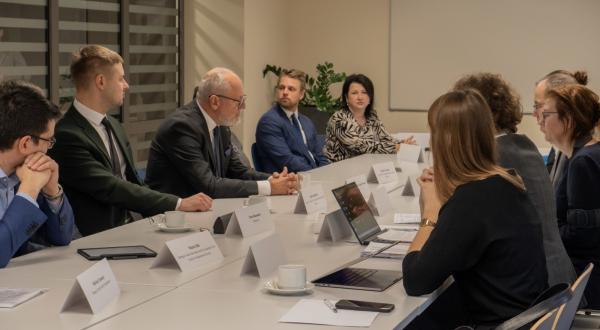Baltic Student Conference of Obstetrics and Gynaecology – innovation, co-operation, experience
Written by Ieva Siksaliete, Head of the RSU Obstetrics and Gynaecology Student Interest Group
Photos by Rihards Sližāns
On May 10, the Baltic Student Conference of Obstetrics and Gynaecology took place at the Clinical Skills Centre (Campus) of Rīga Stradiņš University, bringing together medical students from all three Baltic countries. This tradition began in 2015 but was interrupted due to the COVID-19 pandemic. This year’s conference reaffirmed the younger generation of doctors’ keen interest and active engagement in the fields of obstetrics and gynaecology.
During the first part of the conference, students presented reports of adolescent pregnancy trends in their respective countries and participated in a scientific research session, which focused on the theme of “family planning.” In the afternoon, six practical workshops were held, where participants practised various gynaecological procedures using simulations and training models.
Workshops and simulation — new skills for the budding specialists
In total, the conference welcomed 100 attendees and 10 physician-mentors. One of the practical workshops – the Papaya workshop – offered participants the opportunity to learn uterine curettage and vacuum extraction techniques using a papaya as a simulated uterus. The simulation required various gynaecological instruments, including cervical dilators. On this occasion, 3D-printed dilators were used. The samples for 3D scanning were provided by Pauls Stradiņš Clinical University Hospital, while the instruments themselves were produced using 3D printing technology by the RSU Medical Education Technology Centre. The instruments were developed following an initiative by Ieva Siksaliete, head of the RSU Obstetrics and Gynaecology Student Interest Group. These 3D-printed dilators will enable even more realistic and effective simulations for future specialists.
International co-operation and experience exchange
Students from RSU, the University of Latvia, Vilnius University, the University of Tartu, and the Lithuanian University of Health Sciences took part in organizing of the event. Valuable contributions were also provided by faculty members and medical professionals, including Professor Rezeberga, Professor Miskova, Dr. Ārgale, Dr. Rostoka, Dr. Puksta Gulbe, Dr. Grabe, Dr. Plisko, Dr. Penka, Dr. Veisa, and Dr. Galsone. Significant support for the implementation of the practical workshops was provided by the team from the RSU MITC.
Austėja Zubauskaitė, head of the student group from Vilnius University, shared her impressions: “We were very pleased to be part of this wonderful event. It was a great opportunity not only to meet students from the Baltic countries but also to exchange insights about the differences in medical practices across our countries.
This dialogue opened new paths for future collaborations in scientific research.
We look forward to meeting again next year!”
Grete Tõniste, president of the student group from the University of Tartu, added: “I absolutely loved the event and I am sure other participants did as well.
The students from all Baltic countries connecting and sharing experiences on such an important topic allows us to improve as future doctors and medical professionals.
The practical workshops were fantastic as well.”
Much more than just an academic event
This conference was much more than just an academic event for the students—it was an opportunity to present their work in an international setting, engage in discussion with experienced professionals, gain practical skills, and find inspiration for their future careers.
The successful organization of the event was made possible by a dedicated team of students from across the Baltic region. Organizers from Latvia included Ieva Siksaliete, Elizabete Romanovska (RSU Obstetrics and Gynaecology Student Interest Group, Latvian division), Meagan Hsung, Julia Kottmann, Mathilda Tafener, and Swamy Stefaner (RSU Academic Society of Obstetrics and Gynaecology, international division), along with Arta Ārsmeniece and Beatrise Dinsberga (Obstetrics and Gynaecology Student Club from the University of Latvia). Organizers from Lithuania and Estonia included Austėja Zubauskaitė (OB/GYN student group from Vilnius University); Gabija Grezeckaite, Aleksandra Kolobova, Urte Ivanovaite, and Migle Remeikaite (OB/GYN student group from the Lithuanian University of Health Sciences); and Grete Tõniste and Laura Kranich (OB/GYN student group from the University of Tartu).
Related news
 RSU Medicine study programme receives international recognition and maximum-term accreditationFor RSU Employees, For Students
RSU Medicine study programme receives international recognition and maximum-term accreditationFor RSU Employees, For Students






























